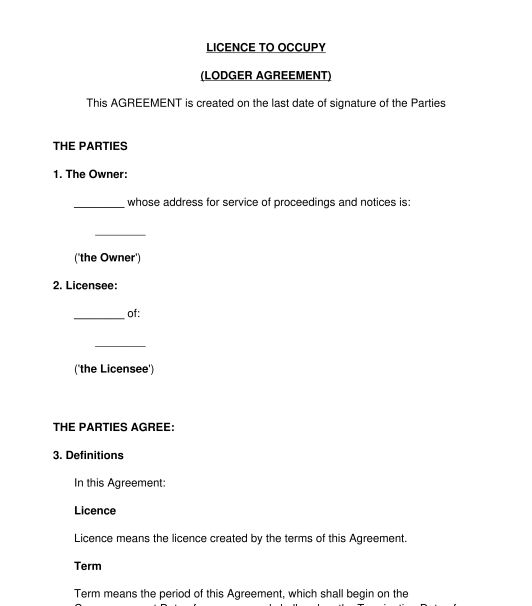 09/11/2025
09/11/2025

Answer a few questions and your document is created automatically.

Your document is ready! You will receive it in Word and PDF formats. You will be able to modify it.




Rating: 4.5 - 183 votes
Fill out the templateA lodger agreement is an agreement that grants permission for a person to occupy a room within a residential property. This lodger agreement is an agreement that can be used for properties in England.
A different type of lodger agreement may be used for properties in Scotland.
A lodger agreement is different from a tenancy agreement. A tenant will have particular rights under a tenancy agreement (including protection from unfair eviction).
A tenant will enjoy exclusive occupation of the relevant space, whereas a lodger will only have the right to use a certain space or room, in common with the owner. This means the owner (landlord) will retain the right to enter the room or space occupied by the lodger in all circumstances.
No. It is possible for a landlord to allow a person to live in a room of a property without a formal written agreement. However, it is always best to set out an agreement in writing so that the lodger and the landlord have a clear understanding of the agreement.
In particular, the agreement will help the lodger to understand the extent of the agreement and the terms of occupation. It can be helpful to confirm that the lodger does not have the status of a tenant (and therefore has fewer rights).
The formal legal term for a lodger agreement is a 'licence to occupy'. A licence is an agreement that permits a person to do something. The purpose of a licence is to give permission to a person to occupy a space or part of a property. A licence is different to a tenancy agreement.
A different type of licence agreement should be used for a licence to occupy in a business/commercial setting.
Before the start of a lodger agreement, the landlord should:
The landlord must have the authority to let the room, so they must either own the property or have a legal right or interest in the property. The landlord should ensure that they have the relevant permission to let the room, which will include permission from a mortgage lender (if the property is owned) or from their landlord (if the property is rented).
The lodger should be over the age of 18 and must have the right to rent a room in the United Kingdom.
A person who is under 18 should not generally sign a lodger agreement. A landlord should not grant a lodger agreement to a person if they do not have the right to rent a room in the United Kingdom.
The parties can agree for a lodger agreement to be in place for a fixed period of time, or they can agree that there will be no specified end date. In any event, there will be a provision for the parties to give notice to terminate the agreement.
After the document has been signed by both parties, each party should retain a signed copy. The owner will provide the lodger with an inventory and schedule of condition* before the start date of the agreement. The lodger may then occupy the space under the terms of the agreement.
A property inventory and schedule of condition will provide a summary of all the items (such as furniture and white goods) in the property and will note the condition of those items.
The parties might wish to receive advice about the terms of the agreement before signing the document.
The lodger agreement is not reviewed by a lawyer to ensure that the legal content applies to the personal situation of the parties.
In order to review the particulars of the agreement, it will be necessary to instruct a lawyer. It will be necessary to consult with a lawyer who is regulated by an approved regulator in the legal services sector. It is possible to search for a lawyer using the Law Society – find a solicitor webpage.
The lodger agreement should:
The case of Street v Mountford [1985] 2 All ER 289 examined the distinction between a licence to occupy and a tenancy agreement. General guidance about this distinction is available on the Shelter website. A tenant under a tenancy agreement will have more legal rights than a lodger.
The following legal provisions are also relevant:
A property owner should also consider safety/legal requirements relating to:
You fill out a form. The document is created before your eyes as you respond to the questions.
At the end, you receive it in Word and PDF formats. You can modify it and reuse it.
Guides to help you
Lodger Agreement - Sample, template - Word & PDF
Country: United Kingdom